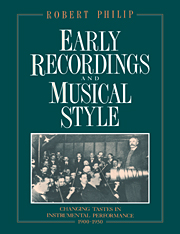Summary
While the use of vibrato by string-players was gradually increasing over the first half of the twentieth century, the use of portamento, or audible sliding, was becoming less frequent and more subtle. In the early years of the century the portamento was used very frequently by violinists, often routinely at any change of position. On the cello, with its greater distances and more frequent changes of position, the portamento tended to be even more frequent and more prominent than on the violin. On both instruments by the 1930s it was coming to be viewed as an ornament requiring delicate treatment.
In Grove I (1879–89) J. A. Fuller-Maitland defines portamento as 'A gradual carrying of the sound or voice with extreme smoothness from one note to another … It is of frequent occurrence as a musical direction in vocal music or in that for stringed instruments …' In Grove II (1904–10) this definition is reprinted, and under 'slide' there is also the following comment by Olga Racster: 'To violinists the "slide" is one of the principle vehicles of expression, at the same time affording a means of passing from one note to another at a distance. The rules governing the "slide" are not restricted, as its use and effect depend upon the judgement of the player.' Many writers in the early years of the twentieth century recommend the portamento as essential to fine violin-playing, and, as with vibrato, several stress the link between string-playing and singing.
- Type
- Chapter
- Information
- Early Recordings and Musical StyleChanging Tastes in Instrumental Performance, 1900–1950, pp. 143 - 178Publisher: Cambridge University PressPrint publication year: 1992



